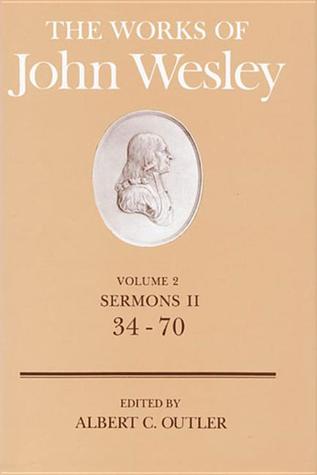The Works of John Wesley Vol 2: Sermons II (34-70)
by John Wesley
This is the second in an eagerly awaited series of four volumes of John Wesley's sermons. This volume contains sermons 34-70 from Sermons on Several Occasions.
Of all the genres in Wesley's prodigious output, his sermons most clearly focus and expound his understanding of Christian existence. Outler's introduction in the first volume concentrates two decades of painstaking research and thought on Wesley. From this he ably sets the stage for a fuller understanding and appreciation of a major Christian heritage, a heritage which can at last be seen as a whole against the background of its sources.
The four volumes contain 151 sermons, including a number recovered from Wesley's manuscripts. These constitute the core of Wesley's doctrinal teachings upon which his own evangelical movement was founded. Following Wesley's own ordering, Dr. Outler begins with the familiar Sermons on Several Occasions, which present Wesley's basic teachings on salvation and form the bulk of the first two volumes in the series. Outler masterfully demonstrates the significance of all the subsequent sermons since they exhibit Wesley's entire approach to the Christian life. Each volume is rich with footnotes that include the identification of quotations, elucidation of references, the tracing of key themes, and vital background information on each sermon. Representing the culmination of twenty years of exhaustive research, it is the purpose of these conclusive volumes to keep alive the growing interest in Wesleyan studies for the entire Christian church.
Of all the genres in Wesley's prodigious output, his sermons most clearly focus and expound his understanding of Christian existence. Outler's introduction in the first volume concentrates two decades of painstaking research and thought on Wesley. From this he ably sets the stage for a fuller understanding and appreciation of a major Christian heritage, a heritage which can at last be seen as a whole against the background of its sources.
The four volumes contain 151 sermons, including a number recovered from Wesley's manuscripts. These constitute the core of Wesley's doctrinal teachings upon which his own evangelical movement was founded. Following Wesley's own ordering, Dr. Outler begins with the familiar Sermons on Several Occasions, which present Wesley's basic teachings on salvation and form the bulk of the first two volumes in the series. Outler masterfully demonstrates the significance of all the subsequent sermons since they exhibit Wesley's entire approach to the Christian life. Each volume is rich with footnotes that include the identification of quotations, elucidation of references, the tracing of key themes, and vital background information on each sermon. Representing the culmination of twenty years of exhaustive research, it is the purpose of these conclusive volumes to keep alive the growing interest in Wesleyan studies for the entire Christian church.
BUY NOW
Hardcover, 642 pages
Published November 1st 1985 by Abingdon Press
© 2025 Bibleportal.com 版权所有.

John Wesley (1703 - 1791)
Was an Anglican cleric and Christian theologian. Wesley is largely credited, along with his brother Charles Wesley, as founding the Methodist movement which began when he took to open-air preaching in a similar manner to George Whitefield. In contrast to Whitefield's Calvinism, Wesley embraced the Arminian doctrines that were dominant in the 18th-century Church of England. Methodism in both forms became a highly successful evangelical movement in Britain, which encouraged people to experience Jesus Christ personally.Wesley helped to organise and form societies of Christians throughout Great Britain, North America and Ireland as small groups that developed intensive, personal accountability, discipleship and religious instruction among members. His great contribution was to appoint itinerant, unordained preachers who travelled widely to evangelise and care for people in the societies. Under Wesley's direction, Methodists became leaders in many social issues of the day, including the prison reform and abolitionism movements.
John Wesley was an Anglican cleric and Christian theologian. Wesley is largely credited, along with his brother Charles Wesley, with founding the Methodist movement which began when he took to open-air preaching in a similar manner to George Whitefield. In contrast to George Whitefield's Calvinism (which later led to the forming of the Calvinistic Methodists), Wesley embraced Arminianism. Methodism in both forms was a highly successful evangelical movement in the United Kingdom, which encouraged people to experience Christ personally.
Wesley believed that this doctrine should be constantly preached, especially among the people called Methodists. In fact, he contended that the purpose of the Methodist movement was to "spread scriptural holiness across England."
Throughout his life, Wesley remained within the Church of England and insisted that his movement was well within the bounds of the Anglican tradition. His maverick use of church policy put him at odds with many within the Church of England, though toward the end of his life he was widely respected.
John Wesley was the founder of the Methodist movement which grew from the 'Holy Club' of his Oxford friends into a great religious revival. An indefatigable traveller, preacher and writer, Wesley averaged 8,000 miles a year on horseback and gave 15 sermons a week. The reluctance of the Anglican clergy to lend him their pulpits led him to give some of his sermons in the open air, a decision which enabled him to reach those among the poorer sections of society who were not accustomed to going to church.
... Show more